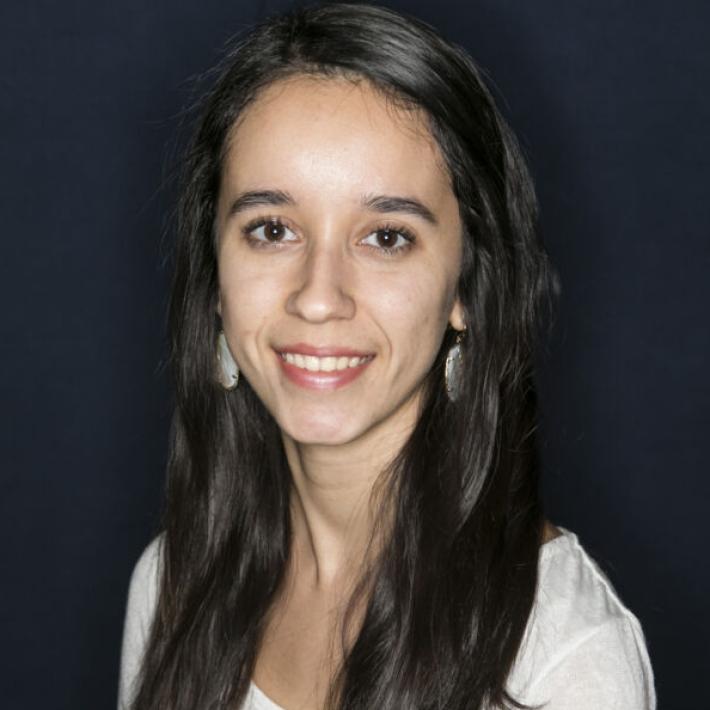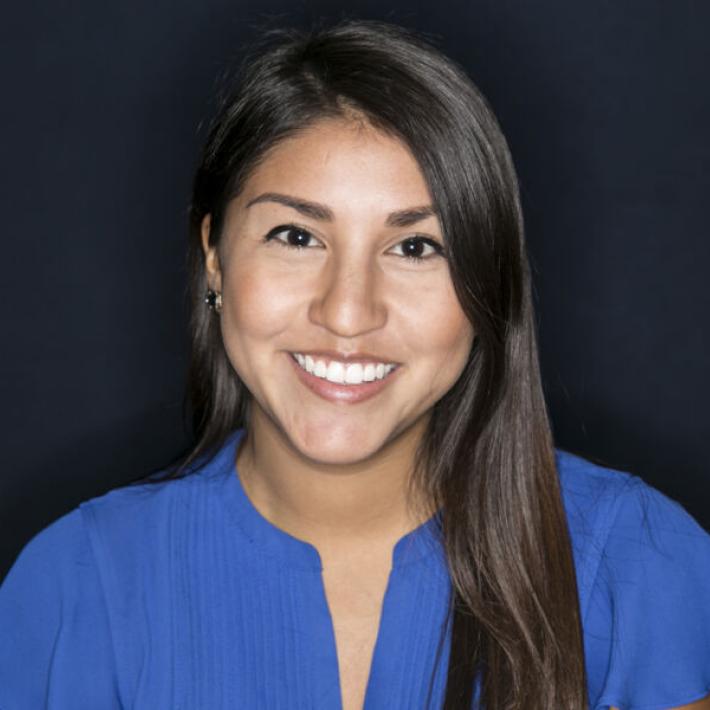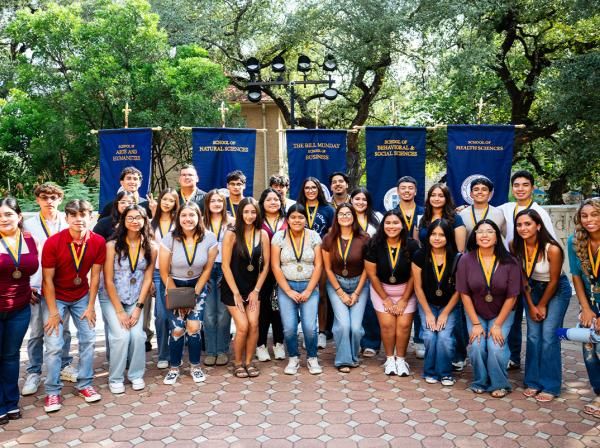Make the Most of Your College Experience
Go to college. Choose major. Take classes. Earn degree. Seems simple enough. But life (and higher education) is rarely so straightforward. On the hilltop, the “traditional” undergraduate experience is anything but, as students step beyond the walls of their classrooms and into study abroad programs, national and international service learning, real-world research projects, student organizations and more.
The résumés of recent grads read more like Choose Your Own Adventure books, with an infinite number of paths to follow. Here, four undergrads and two MBA graduates take us along for the ride.
Tanzania by Tomorrow
When meeting the village locals near Moshi, Tanzania, Courtney Brock ’15 got asked three questions. Are you married? How many kids do you have? What’s wrong with you?
The American twentysomething continually surprised everyone by telling them that she was studying biology and planned to become a doctor before she married and started a family. She had traveled to Tanzania to volunteer with International Service Learning (ISL), a nongovernmental organization that leads service trips and offers aid in developing countries.
Brock spent three weeks in the summer before her junior year with ISL’s General Med Team, which pairs pre-medical students with a global healthcare team on the ground in local villages. She connected with the program through her involvement in the American Medical Association Student Chapter at St. Edward’s. Brock helped establish and run three clinics in rural villages, where the team treated as many as 150 people a day for ailments like backaches and arthritis, vision problems, and the ever-present malaria.
“In their experiences, people in scrubs only came to their village when something terrible was happening, so our presence often made people uncomfortable,” she remembers. “But there were no hospitals nearby, so if something was bothering them, we were really their only option.”
The medical team also enticed people to visit by offering free basic but critical supplies like soap, toothbrushes and shoes. Brock even gave away her eyeglasses to a child who could no longer read the chalkboard at school.
“I still think a lot about the children I met,” she says. “Many of the things we treated them for could be fixed with therapy or education here in the United States, but their parents didn’t have those resources as an option. They were doing the best they could, but in so many cases, it wasn’t enough.”
When she returned from Tanzania, Brock channeled that empathy into a volunteer position in the ER unit at St. David’s Medical Center. She helped relieve the burden on the nurses by restocking supply rooms and providing simple things like pillows and blankets to patients. But she realized pretty quickly that just as much as fresh linens, the patients she visited wanted company.
“When someone gets sick, many people feel uncomfortable and don’t know what to say or do. It can be alienating,” says Brock, who is now conducting cancer genetics research at MD Anderson Cancer Center and plans to start medical school in two years. “I talked to them and tried not to let their illness shape my perceptions of who they were. And if the conversation flagged a little, I asked about grandkids, and out came the pictures!”
Both experiences — halfway across the world and right down the road — taught her that “so many things are universal. No matter where they are, people want to take care of their families and be taken care of themselves. They want friends and a sense of community. And being a doctor is about more than treating patients and making them better — it’s about providing for those basic human needs, too.”

“So many things are universal. No matter where they are, people want to take care of their families and be taken care of themselves.”
Surprise, You're a Leader
A commuter student, Nathalie Eguiza ’15 spent her freshman year trying to adjust to college classes while living at home. She found it hard to make friends, and between going to her classes and driving to and from them, she had little time for anything else. “It was a rough year,” she remembers.
Her sophomore year, she unintentionally walked into the university’s Involvement Fair and then spotted the intern from her Freshman Studies class the previous year. He was working at the Student Life table and told her she would be a good fit for Hilltop Leaders, a yearlong program designed to guide underclassmen through an exploration of leadership styles and skills.
She applied but with hesitation. “I always wanted to get more involved, but being an introvert made it challenging to put myself out there,” she says. “I had to give myself a pep talk and say, ‘College is the time to try new things. Just go for it, Nathalie.’”
She did. And she was accepted. She spent her sophomore year with 14 other students attending workshops, listening to guest speakers, identifying her strengths and working on group projects. The students traveled to Washington, D.C., for a week to hear from leaders like the late Brandon Lepow ’05, a longtime aide to President Barack Obama. At the end of the year, the group combined their talents to coordinate a school-supply drive and cookout for a low-income neighborhood near the St. Edward’s campus.
Over the next three years, she would take part in nearly every leadership program St. Edward’s offers — LeaderShape, Leading EDGE, EcoLead, OrgCon and more — all of which helped her identify her talents, clarify her own sense of leadership and put those skills into practice.
“During Hilltop Leaders, I learned that being quiet didn’t have to be a bad thing,” she says. “In some of the assessments we took, I identified being a helper as my biggest leadership strength, and I learned to use that strength to listen and help others find their own way through challenges.”
She began volunteering at the Riverside Nursing and Rehab Center and teaching an informal painting class to her assigned buddy, a resident named Tina. She signed up for Campus Ministry Service Break Experiences at an Apache reservation in Arizona and an orphanage in Jamaica. She also served as the executive coordinator of Student Life’s Transitional Experiences Council, where she oversaw five student coordinators and helped with the programs they carried out.
“I never thought that would be me, but I’ve learned that anyone can be a leader,” says Eguiza, who now works for the American Heart Association. “Everyone can have their own style — there’s not just one way, there are many.”

“I never thought that would be me, but I’ve learned that anyone can be a leader.”
Seville or Bust
Daniel Cardenas ’15 admits he spent his first week studying abroad in Seville, Spain, freaking out. He had been pickpocketed, losing his cell phone and real-time connection to friends and family back home. Then, he walked into his Intermediate Spanish class to find that the native Spanish professor spoke only, well, Spanish. “I was expecting it to be challenging,” he says, “but everything, right down to the syllabus, was in Spanish. My skills were definitely put to the test right from the beginning.”
Cardenas was one of 70 American students from universities across the country (and one of 11 from St. Edward’s) to participate in the Seville summer program, which is coordinated through a partnership with the Universidad Internacional Menéndez Pelayo. There was also a group of students from China.
“I remember working on several projects with the Chinese students, and the only way we could communicate was through our broken Spanish,” he says. “It was pretty surreal, but we made it work.”
During the six weeks he spent in Spain the summer before his senior year, Cardenas traveled to Madrid, Córdoba and Toledo and visited Lagos, Portugal. He walked Seville’s Old City and explored even older churches; snapped pictures at the tomb of Christopher Columbus and the mushroom-like Metropol Parasol, the world’s largest wooden structure; tried to learn flamenco dancing; and picnicked in the lush Parque de María Luisa. He and a friend got locked out of the famous Alcázar palace: An unfortunately timed bathroom break meant the tour left without them but with their ticket stubs. “The outside of that mosque was actually gorgeous,” he says, “and I got to see it for two hours while we tried to explain what had happened and get back inside.”
The delicious sangria and tapas dishes like jamón and pulpo more than made up for the cultural mishaps. “The patatas bravas with garlic mayo was my absolute favorite,” says Cardenas, who wrote a paper on the culinary tradition of tapas for a Cultural Foundations class that summer. He also got to experience the frenzy of a World Cup, cheering on the rojo y amarillo in Seville’s famous Plaza de la Encarnación. Then there was the face paint. “A friend and I went to a tapas bar to watch a game, and our waitress wouldn’t let us pay for our food unless we let her paint the Spanish flag on our faces!”
An Accounting graduate who is now preparing to sit for the CPA exam, Cardenas loved being fully immersed in something so foreign. “It was like having a new life for six weeks — a complete vacation from everything I knew, with new people in a new environment,” he says. “I knew I wouldn’t get the chance to experience a different culture and place firsthand again, so I didn’t really think about being so far from home. I just jumped in.”

“It was like having a new life for six weeks — a complete vacation from everything I knew, with new people in a new environment.”
From Reel to Real
When Associate Professor of Communication Shannan Butler cued up the documentary Tough Guise during his Media Studies class, then-sophomore Mary Kathryn Flores ’15, MBA ’18 had no idea it would change the focus of her academic career. And she had even less of an inkling that two years later, she would be interviewing the film’s creator about one of its major themes — violence against women.
The film piqued Flores’ interest in how various channels of communication perpetuate mindsets that degrade women. “There are so many areas of society where violence against women is downplayed — the law, the media, sexual assault, victim blaming and shaming,” she says. “Once I started to see how much there was to explore, I kept that focus for writing assignments in my classes whenever I could.”
Her professors encouraged her interest, guiding her through more than one bout of frustration over research and the daunting breadth of topics. When she was thinking of abandoning a paper on feminism, Assistant Professor of University Studies Alex Barron talked her through it. “She told me, ‘I know you love this topic because I can see it in your eyes. Stick with it.’”
Associate Professor of Communication Tere Garza could see it, too. She invited Flores to attend the annual National Communication Association conference in Chicago her junior year as a representative of the university’s communication honor society, of which Flores was co-president. In Chicago, she honed in on the conference’s Feminist and Women’s Studies track, marveling at the passion she sensed among the presenters and kindling her own. Back in Austin, she got involved with BeVocal, a movement that focuses on bystander intervention as a way to curb violence against women. And she decided to email Jackson Katz, creator and co-writer of the Tough Guise series (there are now two films) and an outspoken advocate for BeVocal’s bystander-intervention platform.
“I needed to interview someone who was influential for my Capstone paper, and I thought, ‘Why not him?’” she says. “I knew he was going to be at a BeVocal event coming up at the University of Texas, so I found his email address online and sent him a message.”
Not only did he write back, he offered to talk in person after his Austin speech. That’s how she found herself snaking through an excruciatingly slow line waiting to meet Katz last March on the UT campus. Finally, she got her turn and introduced herself. Despite the hours he had been talking and the many hands he had already shaken, he took the time to answer her questions.
“Experiences like that are one of the biggest takeaways from my time at St. Edward’s,” says Flores, who is a content management associate at Dimensional Fund Advisors and recently started her MBA at St. Edward’s. “You can’t be afraid to reach out to people, whether it’s a professor or a famous activist. You have to be the one who starts the conversation.”

“You can’t be afraid to reach out to people, whether it’s a professor or a famous activist. You have to be the one who starts the conversation.”
Startups and Stand Outs
In their final class before graduation, Layne Cassidy MBA ’15 and Bill Yeager MBA ’15 had no idea they’d become experts on the subject of energy poverty. They’d actually never heard of the issue. But during their last semester, they completed a consulting project for Gridmates, an Austin-based crowdfunding initiative that provides energy to low-income families around the world. Over five months, Cassidy and Yeager met weekly with Gridmates’ founder to hammer out the company’s goals, strengthen its peer-to-peer donation model, identify possible industry partners and engage donors.
“We were able to dig down and learn this issue inside and out,” says Yeager. “We both felt confident knowing we had the knowledge and skills to evaluate the market — and then communicate our ideas effectively to someone at the executive level.”
Both drew on their previous experiences in the MBA program. Cassidy had interned at a startup that eventually went under, then joined her former boss at a new startup for a second internship that turned into a job as operations manager. His first summer as an MBA student, Yeager had interned at Turner Broadcasting’s headquarters in Atlanta, Georgia, his résumé having been pulled from a pile of applications from around the country for its breadth and depth. Cassidy and Yeager also won first place in last year’s annual MBA business plan competition for a font-recognition app targeted to graphic designers.
“As I was working on them, I knew I’d see every one of the business situations from my internship and the competition again one day,” says Yeager. “So when we started the Gridmates project, I knew I could handle it. It was a challenging semester, but I was comfortable with the marketing skills I needed, and I had practice presenting to clients.”
“All of my experiences in the MBA program taught me to take the initiative and solve problems,” agrees Cassidy. “I’ve learned that I can add value minute by minute to any situation.”

“I’ve learned that I can add value minute by minute to any situation.”


